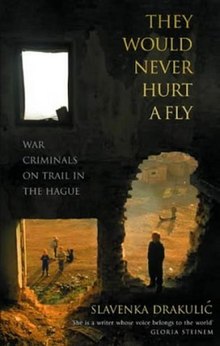They Would Never Hurt a Fly (Croatian: Oni ne bi ni mrava zgazili) is a 2004 historical non-fiction novel by Slavenka Drakulić discussing the personalities of the war criminals on trial in The Hague that destroyed the former Yugoslavia (see International Criminal Tribunal for the Former Yugoslavia). Drakulić uses certain trials of alleged criminals with subordinate power to further examine and understand the reasoning behind their misconducts. Most of those discussed are already convicted. In her book, Drakulić does not cover Radovan Karadžić, however, Slobodan Milošević and his wife each rate their own chapter, and Ratko Mladić is portrayed as a Greek tragic figure. There are no pictures, although the physical appearances of the characters are continuously mentioned.
 First edition | |
| Author | Slavenka Drakulić |
|---|---|
| Language | English |
| Genre | Non-fiction, History |
| Publisher | Little Brown |
Publication date | 2003 |
| Media type | Print (paperback) |
| Pages | 182 |
| ISBN | 0-349-11775-6 |
Synopsis edit
They Would Never Hurt a Fly begins with an introductory section explaining Drakulić's purpose in the book as well as her choice in characters. She explains that she wants to learn more about their personalities in order to justify how the Yugoslavian war arose. Drakulić describes the war as an unexpected tragedy that embarked on innocent civilians within the boundaries of Yugoslavia - specifically Bosnia. As the book begins to unravel descriptive profiles of different war criminals, Drakulić elucidates that these criminals were not completely monsters, but ordinary people who committed crimes due to the circumstances they were in. She takes this stance not to sympathize with them, but because "the war itself turned ordinary men [...] into criminals because of opportunism, fear and, not least, conviction."[1] By treating such people as criminals without understanding their background, she argues, put them in a different class of people that they could never be a part of. As a result, they refuse to believe that themselves, their neighbours or their co-workers could commit such acts. Many of the perpetrators actually regard themselves as heroes rather than criminals and only regret "that they have been stupid enough to get caught or being tricked into surrendering." This argument is mirrored with political theorist Hannah Arendt's thesis on the Banality of Evil.[1][2][3]
The book ends noting the strange coexistence that the accused war criminals have together in the Scheveningen prison in The Hague. Despite containing people who had committed atrocities at all levels, there was only one incident that occurred when Slobodan Milošević was first brought to the "detention unit". Despite this, most of those convicted put aside their nationality and their ethnic backgrounds, and formed alliances based on brotherhood and friendship. As Irish director of the "unit", Timothy McFadden argues the accused are held as innocent until proven guilty, and thus are treated to better living conditions than any other prison in Europe, and possibly the world.[1] They can watch television shows in their own language (via satellite) enclosed in their fairly spacious cells, have visitors as frequently as they would like, take a variety of classes, and so on. Drakulić notes the disparity between their living conditions and the crimes they are accused of, then ends by questioning the aim of the war if the greatest architects of it can get along with no animosity or patriotic feelings behind closed doors. The answer, she concludes, is that it was ultimately for nothing.
Reception edit
Drakulić received the 2005 Leipzig Book Award for European Understanding for this work.[4]
Popular Reviews edit
Melissa Benn of The Guardian commends Drakulić for how she "demonstrates no little moral courage" in revisiting these historical events so soon after "the horrors of war" ended. Benn speaks positively of Drakulić's high level of detail and handling of moral ambiguity.[5]
Academic Reviews edit
Jens Becker highlights Drakulic's personal history as a Yugoslavian as a means by which Drakulic adds necessary context to her book's discussions in his review for the Journal for Labour and Social Affairs in Eastern Europe. Becker applauds in particular how Drakulic can explore why the war began, how nationalism developed in a generation seemingly born into an integrated environment, and why individuals charged as war criminals are still seen as heroes in their home countries. By exploring detailed backgrounds and wartime accounts, Drakulic can better understand the perpetrators on a human level. In particular, in Drakulic's exploration of Milosevic, she "deprives him of his demonic aura by forming an intelligent portrait," thereby providing a fuller account than one possible with use of just his political or wartime life.[6]
People covered edit
- Rahim Ademi
- Milan Čanić
- Dražen Erdemović
- Stjepan Grandić
- Goran Jelisić
- Radovan Karadžić
- Radomir Kovač
- Radislav Krstić
- Dragoljub Kunarac
- Milan Levar
- Mirjana Marković
- Slobodan Milošević
- Ratko Mladić
- Mirko Norac
- Dragan Obrenović
- Tihomir Orešković
- Biljana Plavšić
- Ivica Rožić
- Zoran Vuković
References edit
- ^ a b c Drakulić, Slavenka (2004). They Would Never Hurt a Fly. Great Britain: Abacus. p. 50. ISBN 0349117756.
- ^ Arendt, Hannah (2006). Eichmann in Jerusalem: A Report on the Banality of Evil. United States: Penguin Classics. pp. 336. ISBN 0143039881.
- ^ Shaina. "Review: They Would Never Hurt A Fly". The Daily Seyahatname. Archived from the original on 26 April 2014. Retrieved 1 April 2013.
- ^ "Leipzig Book Award for European Understanding". City of Leipzig. Retrieved 31 August 2022.
- ^ Benn, Melissa (3 April 2004). "Review: They Would Never Hurt A Fly by Slavenka Drakulic". The Guardian. Retrieved 30 January 2020.
- ^ Becker, Jens (2004). "Just normal guys - The observations of slavenka Drakulić from the War Crimes Tribunal in The Hague". SEER: Journal for Labour and Social Affairs in Eastern Europe. 7 (2): 163–165. ISSN 1435-2869. JSTOR 43294000.